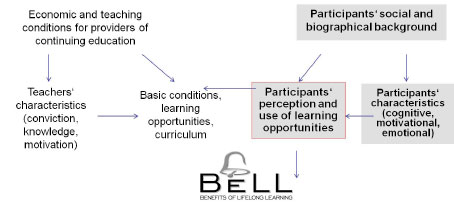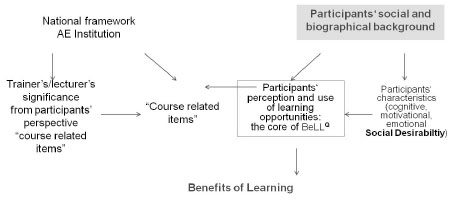The theoretical basis of BeLL study builds on previous studies (eg. Feinstein et al. 2008; Manninen, 2010) and literature (Desjardins 2008; Desjardins & Schuller 2007; Feinstein, Budge, Vorhaus, & Duckworth 2008; Motschilnig 2012). The aim was to get a comprehensive picture about all potential benefits of adult learning in liberal adult education in 10 European countries. Therefore the survey questions were defined using the list of all potential benefits (except lower crime level) found in the previous studies, and by defining these as theoretical concepts. These were then operationalized into respective statements. In addition to theory driven survey analysis and data also qualitative data was collected and analyzed using content analysis. Qualitative data is collected using several open questions in the questionnaire and additional theme interviews. The BeLL-questionnaire contains 39 statements, each of them representing one of the following concepts:
- Psychological concepts (Locus of Control, Self-efficacy)
- Benefit-concepts (Tolerance, Trust, Social network, Sense of Purpose in Life, Civic and Social engagement, Civic Competence, Mental Well-being, Work-related benefits, Physical health, Health behavior, Family, Shifts/Changes in educational Experience)
BeLL-Core-Benefits-Glossary.pdf
In addition, development of skills and competencies is used as one benefit concept in the analysis of qualitative data (open questions in the questionnaire and interviews), but not included in the predefined statements. In addition, four statements controlling Social Desirability (Paulhus 1991) were added in the questionnaire.
The questionnaire is divided into a part that is oriented towards the participation in liberal adult education courses ( number, type and length of courses, course providers); two open questions about changes and benefits of learning and an operationalization of potential wider benefits into statements that can be subjectively assessed by the participants after the attendance of a course as experienced, remembered or recognized in itself: two questions about the course elements and their importance in generating the benefits; an individual-related demographic part; and finally the questionnaire ends with the question if the respondent is willing to participate eventually in a subsequent qualitative interview. The construction of the questionnaire, the systematization and the classification of the constructs have been aligned with results from the educational psychology, classroom research and general psychology (coordinator) in two meetings (cooperation: TU Dortmund, Prof. Dr. Hellmuth Metz-Göckel, general psychology).
The occurrence of learning outcomes is complex.

Both, on the side of the institution and the person there are several spheres of influence. Ultimately crucial for the starting and processing of learning processes is though the learner him-self. Therefore, the questionnaire is indeed recording the parameter of the courses and individual-related demographic data that exceed a “Making up People” (vgl. Wobbe 2012) of the so-called “occupational classification pattern” (gender, age, qualification, profession), but considers also preconditions of the benefit research that are in general central to educational participation: language spoken in the household and civic status. However the central part represents the query and the assessment of subjective experienced consequences after a participation in further education by the concerned people themselves. During the reply of the questionnaire a control of the “social desirability” is running with respect to “self-deception” (through four items of the scale of Munsch et al. 2002, that are both selective and highly loading). This is necessary because lifelong learning in general and learning success could be regarded as positive connotations with social relevance by the respondents and therefore they valuate their answers more positive and not realistic. The recording of subjectively experienced benefits is hence potentially fragile in relation to “social desirability” and needs to be controlled by the scale. Also in this field, the questionnaire is breaking new ground by working on a relatively unknown phenomenon in a field of education “liberal Adult Education/general Adult Eduction” that is strongly under-represented in research.

Sources:
“BeLLQ Questionnaire”, Eds.: Consortium BeLL, Authors: Kil, M./Manninnen, J./Thöne-Geyer, B. (2012)
BELLQ questionnaires:
- Czech Republic
- Finland
- Germany
- German-speaking Switzerland
- Italian-speaking Switzerland
- Italy
- Romania
- Serbia
- Slovenia
- Spain
- UK
References:
- Desjardins, R. (2008). The wider benefits of adult learning. International Encyclopedia of Education. Oxford: Elsevier.
- Desjardins, R. & Schuller, T. (2007). Understanding the Social Outcomes of Learning. Paris: OECD.
- Feinstein, L., Budge, D., Vorhaus, J. & Duckworth, K. (2008). The social and personal benefits of learning: A summary of key research findings. London: Centre for Research on the Wider Benefits of Learning.
- Manninen, J. (2010). Wider Benefits of Learning within Liberal Adult Education System in Finland. In Horsdal, M. (Ed.). Communication, Collaboration and Creativity: Researching Adult Learning. Odense: Syddansk Universitetsforlag.
- Motschilnig, R. (2012). Wider Benefits of Adult Education – An Inventory of Existing Studies and Research. In Adult Education and Development. DVV International, European Association for the Education of Adults, 79-89.
- Kil, M./Motschilnig, R./Thöne-Geyer, B. (2012): Was kann Erwachsenenbildung leisten? Die Benefits von Erwachsenenbildung – Ansatz, Erfassung und Perspektiven/What Can Adult Education Accomplish? The Benefits of Adult Learning – The Approach, Measurement and Prospects. In: Der Pädagogische Blick – Zeitschrift für Wissenschaft und Praxis in pädagogischen Berufen, 20., Jg., H3, S. 164-175. Online link http://www.die-bonn.de/Weiterbildung/Literaturrecherche/details.aspx?ID=10988
